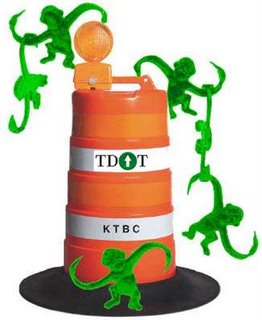March 22: legislative process moves forward with two Tennessee Bottle Bills.
The Scenic Tennessee Tennessee Bottle Bill Project web site is posting that bottle bill legislation will be brought before Tennessee General Assembly house subcommittee on Wednesday, March 22.
SB3629/HB3347: information provided by the Tennessee Bottle Bill Project states that the first of two Tennessee Bottle Bill proposals --- Senate Bill 3629 / House Bill 3347 --- requires that all dealers operate a redemption center unless they are: located within two miles of an independent redemption center; or have less than 5,000 sq. ft. of interior space; or sell beverages only out of vending machines; or subcontract with an independent redemption center (including reverse vending machines) operating on their premises; or subcontract with a mobile redemption center; or provide a satellite drop-off site serving a centralized processing facility; or can show various physical or financial hardships as defined by the commissioner of the Department of Environment and Conservation; or meet various other criteria as defined the commissioner.
SB3616/HB3350: the Tennessee Bottle Bill Project also reports that the other version of the Tennessee Bottle Bill, "...Senate Bill 3616 / House Bill 3350, does not require any dealers to operate a redemption center. They may do so, but they are not required to. Like the other version, this one also authorizes the use of reverse vending machines, mobile redemption centers and satellite drop-off sites."
Also from the Tennessee Bottle Bill Project legislation page:
"The "Tennessee Beverage Container Deposit Act of 2006" (House Bill 3350 / Senate Bill 3616) has been put on the calendar of the House Government Operations Committee for Wednesday, March 22. The committee meets from 10 am to 11 am. If it does not get to the bottle bill in that hour, the bill will be "rolled" to the next week.
Strictly speaking, the job of this committee is simply to review the bill's rulemaking provisions before refering it to the next committee (Local Government Subcommittee of the House State and Local Government Committee). However, we're told that the committee often debates the merits of a bill before sending it along. In other words, though they cannot stop the bill, members of this committee can set a tone, and it's to our advantage that that tone be positive. So please, if you have time, contact the committee members (listed below), urging their support.
And having done that, please do the same for members of the State and Local Government Committee [email links to the Tennessee House Members of the S&L Local Government subcommittee are post at this bog], because they CAN stop the bill.
Be sure to visit the Tennessee Bottle Bill Project legislation web page for complete contact information for your elected representatives within Tennessee General Assembly --- be sure have these bill numbers SB3616/HB3350 and SB3629/HB3347 at hand before making your telephone calls to Nashville.
SB3629/HB3347: information provided by the Tennessee Bottle Bill Project states that the first of two Tennessee Bottle Bill proposals --- Senate Bill 3629 / House Bill 3347 --- requires that all dealers operate a redemption center unless they are: located within two miles of an independent redemption center; or have less than 5,000 sq. ft. of interior space; or sell beverages only out of vending machines; or subcontract with an independent redemption center (including reverse vending machines) operating on their premises; or subcontract with a mobile redemption center; or provide a satellite drop-off site serving a centralized processing facility; or can show various physical or financial hardships as defined by the commissioner of the Department of Environment and Conservation; or meet various other criteria as defined the commissioner.
SB3616/HB3350: the Tennessee Bottle Bill Project also reports that the other version of the Tennessee Bottle Bill, "...Senate Bill 3616 / House Bill 3350, does not require any dealers to operate a redemption center. They may do so, but they are not required to. Like the other version, this one also authorizes the use of reverse vending machines, mobile redemption centers and satellite drop-off sites."
Also from the Tennessee Bottle Bill Project legislation page:
"The "Tennessee Beverage Container Deposit Act of 2006" (House Bill 3350 / Senate Bill 3616) has been put on the calendar of the House Government Operations Committee for Wednesday, March 22. The committee meets from 10 am to 11 am. If it does not get to the bottle bill in that hour, the bill will be "rolled" to the next week.
Strictly speaking, the job of this committee is simply to review the bill's rulemaking provisions before refering it to the next committee (Local Government Subcommittee of the House State and Local Government Committee). However, we're told that the committee often debates the merits of a bill before sending it along. In other words, though they cannot stop the bill, members of this committee can set a tone, and it's to our advantage that that tone be positive. So please, if you have time, contact the committee members (listed below), urging their support.
And having done that, please do the same for members of the State and Local Government Committee [email links to the Tennessee House Members of the S&L Local Government subcommittee are post at this bog], because they CAN stop the bill.
Be sure to visit the Tennessee Bottle Bill Project legislation web page for complete contact information for your elected representatives within Tennessee General Assembly --- be sure have these bill numbers SB3616/HB3350 and SB3629/HB3347 at hand before making your telephone calls to Nashville.




